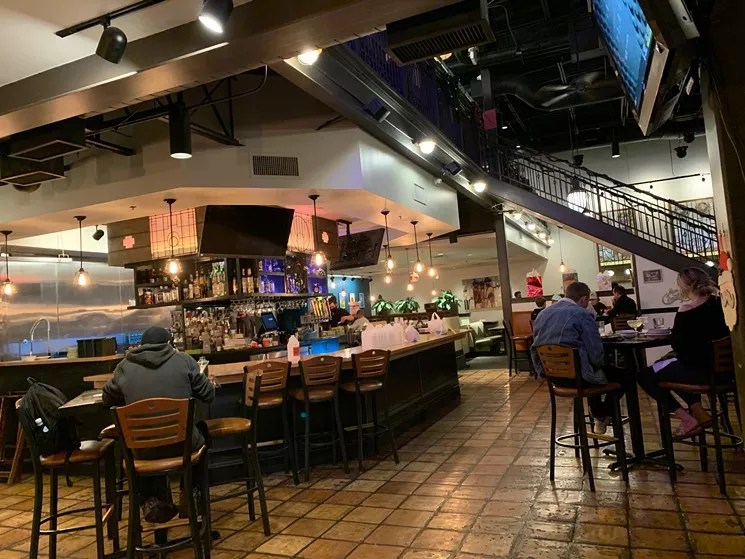
Olivia

Audio By Carbonatix
The Colorado Department of Public Health and Environment rolled out its 5 Star State Certification program in mid-December, allowing approved counties to certify restaurants that meet strict health and safety requirements to operate at more lenient COVID-related restrictions than the rest of the county. That was a month ago, and on January 14 Denver received the okay from the state to begin certifying restaurants and other businesses.
Compare that timeline to Summit County, which was the first county approved by the CDPHE for the F Star program – on December 18. Within three days of receiving approval, the county had already certified more than 130 restaurants, which at that point were allowed to move from Level Red to Level Orange restrictions. So while most of the state’s restaurants were prohibited from any dining room seating (per Level Red restrictions), approved Summit County restaurants were allowed to seat at 25 percent capacity over the holidays.
Governor Jared Polis moved the whole state to Level Orange on January 4, so all Colorado restaurants caught up with Summit County’s 5 Star eateries at that point.
How did Summit County jump on the ball so quickly? Part of a county getting approved by the CDPHE involves forming a committee and submitting details of the county’s COVID response and how it plans to maintain health and safety while giving certified restaurants more leeway to operate. Summit had its committee in place, had its application ready to go and had already enlisted a phalanx of inspectors before the state gave the official nod, so the county was ready to hit the ground running the moment approval was granted.

Douglas County has already implemented its 5 Star program, so restaurants like Rio Grande were able to begin seating at Level Orange before January 4.
Patricia Calhoun
In Denver, government agencies were concerned with moving too quickly while COVID numbers weren’t where they needed to be. “In order to begin implementing the program…Denver must see seven days of Level Orange COVID-19 case metrics,” the Colorado Restaurant Association explained in its recent newsletter. The city also needed to create an online portal for the program, hire inspectors (there are five-week positions available at $20.59 an hour) and implement a plan to pre-certify businesses so that they could move from Level Orange to Level Yellow (seating at 50 percent capacity) as soon as the CDPHE indicates that it’s safe to do so (that’s where the seven straight days of Level Orange numbers comes into play).
“At this point, no efforts to support small businesses can possibly move fast enough,” says Katie Lazor, executive director of EatDenver, a nonprofit organization dedicated to advocating for independent restaurants. “I’m impressed with Summit County’s proactive approach with the program; they had established a dedicated team of auditors before the program was even announced. But in Denver, there were more considerations than the smaller counties who stood this program up so quickly: about 7,000 eligible businesses, funding for the administration of the program and auditing of applicants, a hospital system that is responsible for supporting far more than just its own county, and more. And now, even as we are approved to set up a 5 Star program, our current COVID cases do not allow for those certified businesses to operate at additional capacity yet. In the interest of moving as quickly as possible, Denver’s plan is to pre-certify businesses so that when our COVID cases reach the needed threshold, those businesses will be ready to go when the time comes.”
Lazor is on the new administrative committee overseeing the 5 Star program for Denver, and she notes that while certifying restaurants to increase their capacity will help get them through the pandemic, it’s only one piece of keeping the entire restaurant industry afloat. “Like any other relief program for small business, there is no one-size-fits-all savior, but this program is especially exciting for operators because it offers long-term benefits and allows them to serve more guests and keep more employees employed,” she points out. “The 5 Star program will be a significant support to the industry both by allowing restaurants to operate safely at increased capacity levels and also by helping to improve public confidence in restaurants. 5 Star – combined with the second PPP, an extension of Denver’s third-party delivery fee cap, the continuation of the patio expansion program, state sales tax relief, and for some, access to additional cash grants – will save businesses.”
But the one thing restaurants need most is customers. “None of this is helpful – except the cash grants – if there are little to no guests,” Lazor adds, “so the majority of this support hinges on our COVID cases continually improving and public awareness of the safety measures restaurants are practicing.”